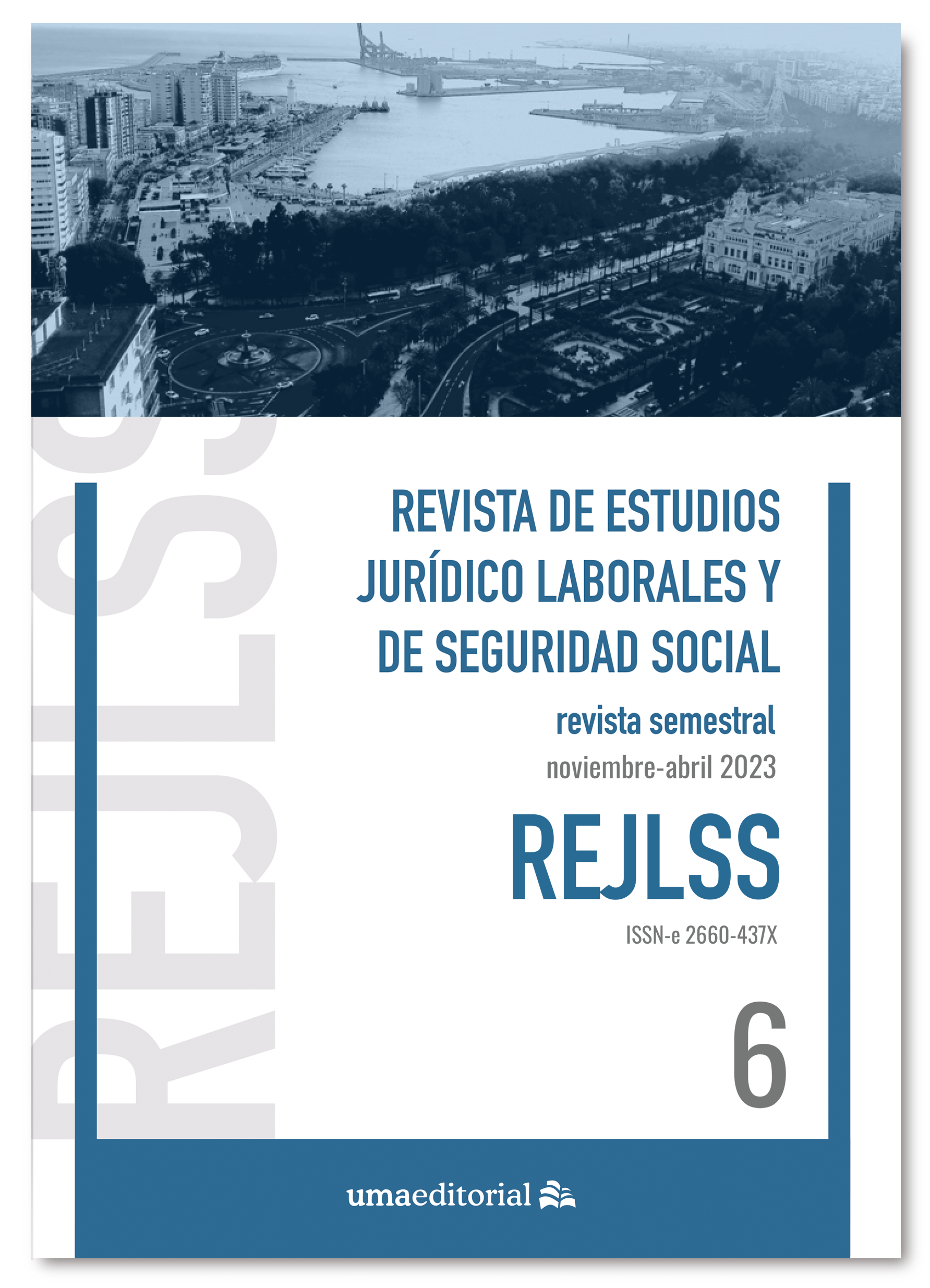AN Adequate Employment Policy for the Changes in Labor Relations of the XXI Century
Study of the Law 3/2023 of 28 February on Employment
DOI:
https://doi.org/10.24310/rejlss.vi6.16187Keywords:
employment, Law,, training, workers, companies, Public AdministrationsAbstract
Approved by the Council of Ministers on June 21, 2022, the Employment Bill, and after its parliamentary processing, has become the Law repealing the one previously in force in 2015. The purpose of this article is, after some general considerations on employment policy at the international and European level, to proceed to the study of the regulation from the beginning of the debates in Parliament. Special attention is paid to those contents that allow us to underline the differences with the previous regulation, while emphasizing the positive aspects of the regulation that should allow us to improve employment both in quantity and quality.
Downloads
Metrics
Publication Facts
Reviewer profiles N/A
Author statements
Indexed in
-
—
- Academic society
- N/A
- Publisher
- Universidad de Málaga. UMA Editorial
References
Cabeza Pereiro, J. y Ballester Pastor, M.A., La estrategia europea para el empleo 2020 y sus repercusiones en el ámbito jurídico laboral español, MTIN, Madrid, 2010.
Calvo Gallego, J. y Rodríguez-Piñero Royo, M. (Dirs)., Colocación y Servicios de Empleo, Consejo Económico y Social, Madrid, 2011.
Camas Roda, F., La formación profesional en los ámbitos educativo y laboral, Ed. Aranzadi, Pamplona, 2007.
Camps Ruiz, L.M., Ramírez Martínez, J.M., y Sala Franco, T. (Dirs)., Crisis, reforma y futuro del Derecho del Trabajo: estudios ofrecidos en memoria del profesor Ignacio Albiol Montesinos, Ed. Tirant lo Blanch, Valencia 2010.
Coalición progresista., Un nuevo acuerdo para España (acuerdo PSOE.UP 30 de diciembre de 2019.
García Quiñones, J.C., Políticas activas de empleo durante la crisis económica (2010–2015), Ed. Reus, Madrid 2015.
García Quiñones, J.C., Políticas activas de empleo, Ed. Tirant Lo Blanch, Valencia, 2022.
OIT, Perspectivas Sociales y del Empleo en el Mundo: Tendencias 2023.
López Insua, B.M., Fernández Bernat, J.A. y Monereo Pérez, J.L., Las políticas activas de empleo: configuración y estudio de su regulación jurídica e institucional, Ed. Aranzadi, Pamplona, 2016.
Molina Hermosilla, O., La dimensión jurídica de la política de empleo, Ed. ARL-Mergablum, Sevilla 2005.
Rojo Torrecilla, E., Servicios públicos de empleo, políticas activas de empleo e intermediación laboral, 9 de diciembre de 2009. Web: http://www.eduardorojotorrecilla.es/2009/12/servicios-publicos-de-empleo-politicas_09.html.
Valdés Dal-Re, F. (Dir.), Comentarios a la Ley de Empleo, Ed. La Ley, Madrid, 2012.
LEGISLACIÓN
Ley 51/1980, de 8 de octubre, Básica de Empleo (BOE, 17).
Ley 47/2003, de 26 de noviembre, General Presupuestaria (BOE, 27).
Real Decreto Legislativo 2/2015, de 23 de octubre, por el que se aprueba el texto refundido de la Ley del Estatuto de los Trabajadores (BOE, 24).
Real Decreto Legislativo 3/2015, de 23 de octubre, por el que se aprueba el texto refundido de la Ley de Empleo (BOE, 24).
Resolución de 29 de abril de 2021, de la Subsecretaría, por la que se publica el Acuerdo del Consejo de Ministros de 27 de abril de 2021, por el que aprueba el Plan de Recuperación, Transformación y Resiliencia (BOE, 30).
Decisión (UE) 2022/2296 del Consejo de 21 de noviembre de 2022 relativa a las orientaciones para las políticas de empleo de los Estados miembros (DOUE, L304, 24).
Ley 27/2022, de 20 de diciembre, de institucionalización de la evaluación de políticas públicas en la Administración General del Estado (BOE, 21).
Ley 3/2023 de 28 de febrero (BOE, 1 de marzo).
Downloads
Published
How to Cite
Issue
Section
License
In the Revista de Estudios Juridico Laborales y de Seguridad Social (REJLSS) we are clearly committed to a policy of open access to scientific knowledge (See Berlin Declaration).
Those authors who have publications with this journal accept the following terms:
This journal provides immediate free access to its content under the principle of making research freely available to the public. All the contents published in the REJLSS are subject to the Creative Commons license
Attribution-NonCommercial-NoDerivatives 4.0 International (CC BY-NC-ND 4.0)
Copyrights are of two kinds: moral and patrimonial. Moral rights are perpetual, inalienable, non-transferable, inalienable, unattachable and imprescriptible prerogatives. In accordance with Spanish copyright legislation, the authors who publish in REJLSS retain the moral right over their work, as well as the ownership of the patrimonial right, which will be transferred to the University of Malaga for its dissemination in open access.
The patrimonial rights, refer to the benefits that are obtained by the use or disclosure of the works. REJLSS is published in open access and is exclusively authorized to perform or authorize by any means the use, distribution, dissemination, reproduction, adaptation, translation or transformation of the work.
It is the responsibility of the authors to obtain the necessary permissions of the images that are subject to copyright.
Authors whose contributions are accepted for publication in this journal retain the non-exclusive right to use their contributions for academic, research and educational purposes, including self-archiving or depositing in open access repositories of any kind.
The electronic edition of this magazine is edited by the Editorial of the University of Malaga (UmaEditorial), being necessary to cite the origin in any partial or total reproduction.
The authors may adopt other non-exclusive license agreements for the distribution of the version of the published work (eg: deposit it in an institutional telematic archive or publish it in a monographic volume) provided that the initial publication is indicated in this magazine.
Authors are allowed and recommended to disseminate their work through the Internet (eg, in institutional telematic archives or on their website) before and during the submission process, which can produce interesting exchanges and increase citations of the published work.







19.png)
